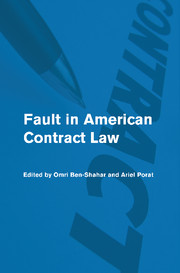Book contents
- Frontmatter
- Contents
- List of Contributors
- Preface
- Acknowledgment
- I THE CASE FOR STRICT LIABILITY
- II THE CASE FOR FAULT
- III BETWEEN STRICT LIABILITY AND FAULT
- IV WILLFUL BREACH
- V COMPARATIVE FAULT
- VI THE MORALITY OF BREACH
- 17 Why Breach of Contract May Not Be Immoral Given the Incompleteness of Contracts
- 18 Fault and Harm in Breach of Contract
- 19 Fault in Contracts: A Psychological Approach
- Case Index
- Subject Index
- References
17 - Why Breach of Contract May Not Be Immoral Given the Incompleteness of Contracts
Published online by Cambridge University Press: 10 November 2010
- Frontmatter
- Contents
- List of Contributors
- Preface
- Acknowledgment
- I THE CASE FOR STRICT LIABILITY
- II THE CASE FOR FAULT
- III BETWEEN STRICT LIABILITY AND FAULT
- IV WILLFUL BREACH
- V COMPARATIVE FAULT
- VI THE MORALITY OF BREACH
- 17 Why Breach of Contract May Not Be Immoral Given the Incompleteness of Contracts
- 18 Fault and Harm in Breach of Contract
- 19 Fault in Contracts: A Psychological Approach
- Case Index
- Subject Index
- References
Summary
There is a widely held view that breach of contract is immoral. In this chapter I suggest that breach may often be seen as moral, once one appreciates that contracts are incompletely detailed agreements and that breach may be committed in problematic contingencies that were not explicitly addressed by the governing contracts. In other words, it is a mistake generally to treat a breach as a violation of a promise that was intended to cover the particular contingency that eventuated.
There is a widely held view that breach of contract is immoral. Yet it is manifest that legal systems ordinarily do allow breach – the law usually permits breach if the offending party pays damages – and it is a commonplace that breach occurs. Thus, a tension exists between the felt sense that wrong has been done when contracts are broken and the actual operation of the law. This opposition has long been remarked by commentators.
Recently I wrote on the question of when breach of contract should be considered immoral. My primary point was that breach may often be seen as moral once one appreciates that contracts are incompletely detailed agreements and that breach may be committed in problematic contingencies that were not explicitly addressed by the governing contracts. In other words, because of contractual incompleteness, it is a mistake generally to treat a breach as a violation of a promise that was intended to cover the particular contingency that eventuated.
- Type
- Chapter
- Information
- Fault in American Contract Law , pp. 257 - 270Publisher: Cambridge University PressPrint publication year: 2010
References
- 6
- Cited by



